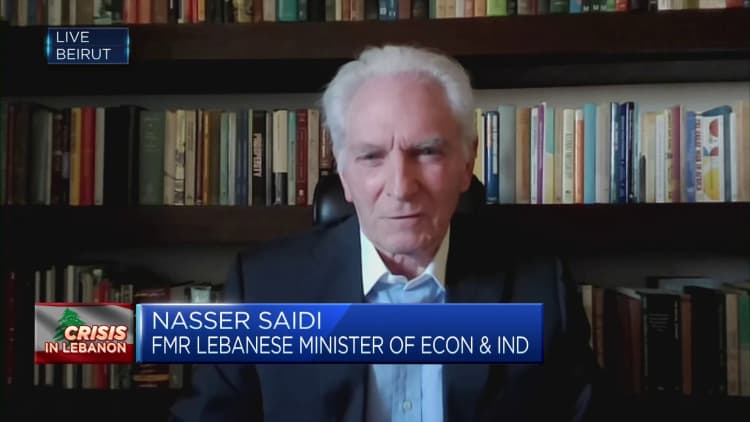
After 30 years as governor of Lebanon’s central bank, Riad Salameh’s tenure came to an end on Monday, leaving behind a deeply criticized legacy. “The loss of savings for several generations of Lebanese” is part of Salameh’s legacy, according to Nasser Saidi, a former vice governor of the Banque du Liban. The country has not yet found an official successor to Salameh, who has served as governor since 1993 amidst recurring political instability.
Wassim Mansouri, the deputy governor, will temporarily take on the role of governor. Salameh expressed hopes that his “successor will be successful.”
Lebanon’s economy, under Salameh’s stewardship, has been plagued by an economic crisis of immense proportions. With foreign reserves below $10 billion, the currency’s value has depreciated nearly 100% against the dollar, and the collapse of Lebanon’s financial system has resulted in estimated losses of $70 billion.
In 2022, the World Bank labeled the country’s economic state as a “Ponzi Finance” scheme, which it claims was deliberately created by Lebanon’s political elite over the past three decades.
An anti-government Lebanese activist displays Lebanese bills during a protest outside the country’s central bank against the continuing downward spiral of the Lebanese pound against the dollar and Riad Salameh’s arrest, under investigation by five European countries.
Picture Alliance | Picture Alliance | Getty Images
Even members of the current government have acknowledged the need for change at the central bank. Lebanon’s Economy and Trade Minister Amin Salam stated in an interview with CNBC that Salameh had been in charge for “way too long.”
Nasser Saidi blames Salameh directly for the country’s economic collapse, holding him responsible for conducting monetary policies that led to the collapse and describing his actions as a Ponzi scheme. However, Salameh left his post with the support of cheering supporters, highlighting the division within Lebanese political society.
Salameh, who is facing international arrest warrants and allegations of fraud, denies being solely responsible for Lebanon’s economic decline. He attributes the decline to various factors, including government exchange policies, waste and losses in the electricity sector, subsidies, political instability, and the cost of hosting Syrian refugees.
Two major policy pillars
In an effort to rebuild Lebanon’s post-war economy, Salameh offered high interest rates to attract deposits from the Lebanese diaspora, which numbers almost 14 million. He also launched a financial engineering operation in 2016 that combined local currency and U.S. dollar deposits to attract foreign reserves and support the economy.
The high interest rates on U.S. dollar deposits helped stabilize Lebanon’s struggling banks but led to the depletion of the country’s reserves. Additionally, Salameh played a key role in maintaining Lebanon’s currency peg to the dollar, which has now largely given way to a black market system with varying rates, leading to a high level of dollarization in the economy due to the significant devaluation of the Lebanese pound.
Lebanon’s Central Bank Governor Riad Salameh gives an interview with AFP at his office in the capital Beirut on December 20, 2021.
Joseph Eid | Afp | Getty Images
Henri Chaoul, a former advisor to Lebanon’s finance minister and the country’s negotiations with the International Monetary Fund, holds Salameh substantially responsible for the economic collapse. He points to Salameh’s failure to reject two major policy pillars, namely the currency peg and the monetization of debt, which led to the catastrophic collapse of the financial sector. Chaoul also mentions Salameh’s alleged involvement in fraud and money laundering activities.
Salameh’s oversight of Lebanon’s debt monetization plan, which allowed the central bank to finance the government, received warnings from Moody’s in 2019 that it could undermine the country’s currency peg and its ability to repay its debts.
Lebanon’s ‘only choice’
Lebanon’s negotiations with the IMF have stalled due to the government’s failure to implement the necessary reforms to unlock aid. The country has been without a consensus on a new president since October of last year, in contradiction to the IMF’s demands.
Nasser Saidi believes that the IMF is Lebanon’s only choice for moving forward, as politicians lack the courage, competence, and willingness to enact reforms. Saidi argues that bringing in the IMF, which would impose conditions, is the best way to address the corruption and serve the country’s interests.
Denial of responsibility! VigourTimes is an automatic aggregator of Global media. In each content, the hyperlink to the primary source is specified. All trademarks belong to their rightful owners, and all materials to their authors. For any complaint, please reach us at – [email protected]. We will take necessary action within 24 hours.


